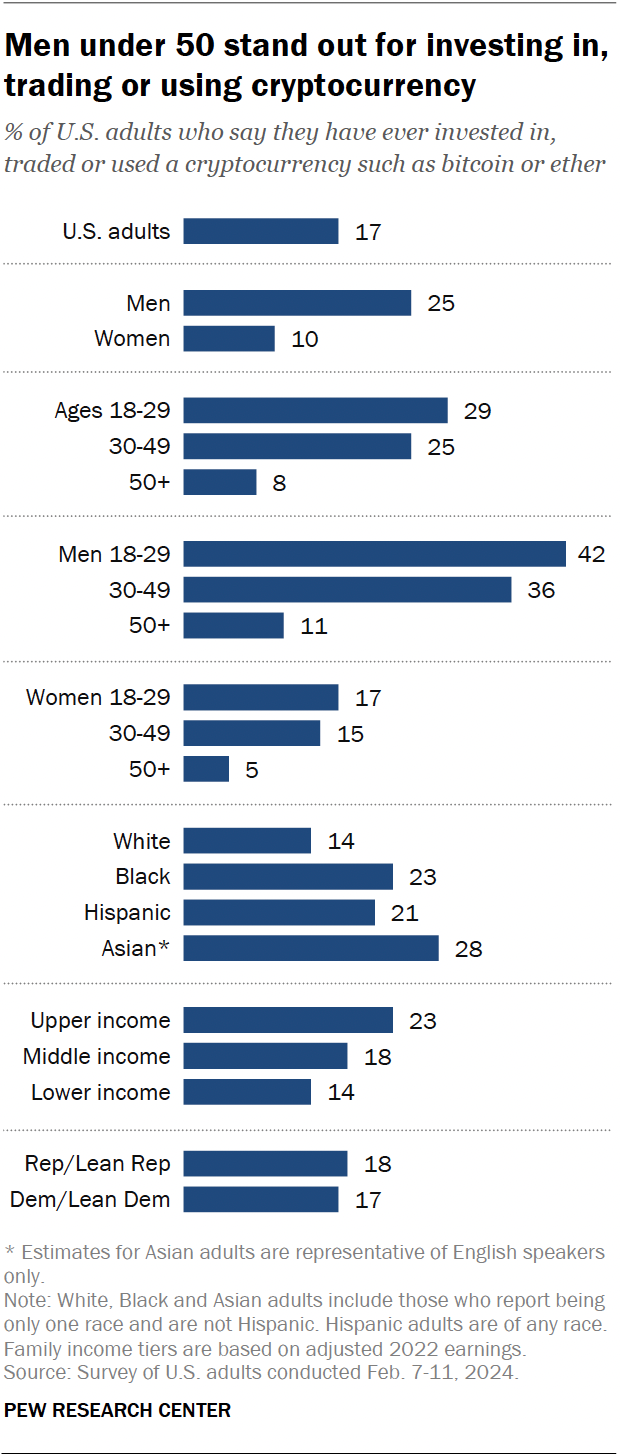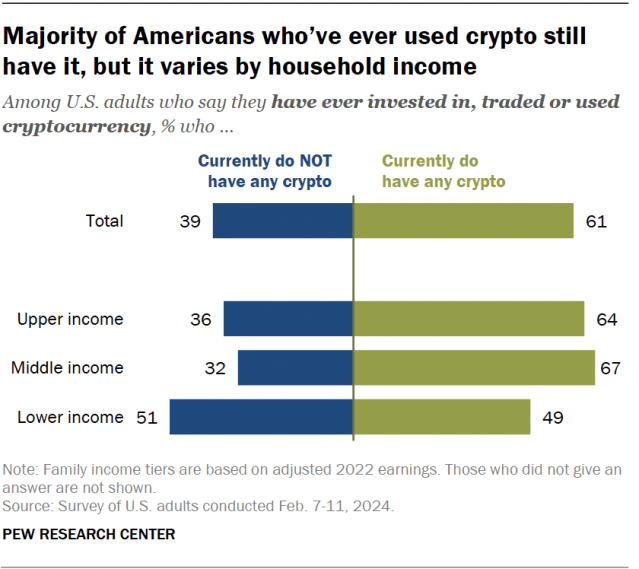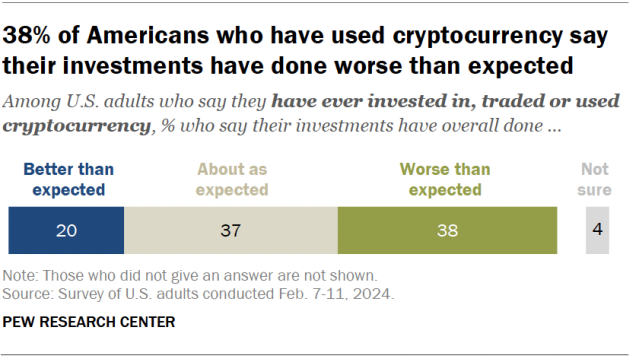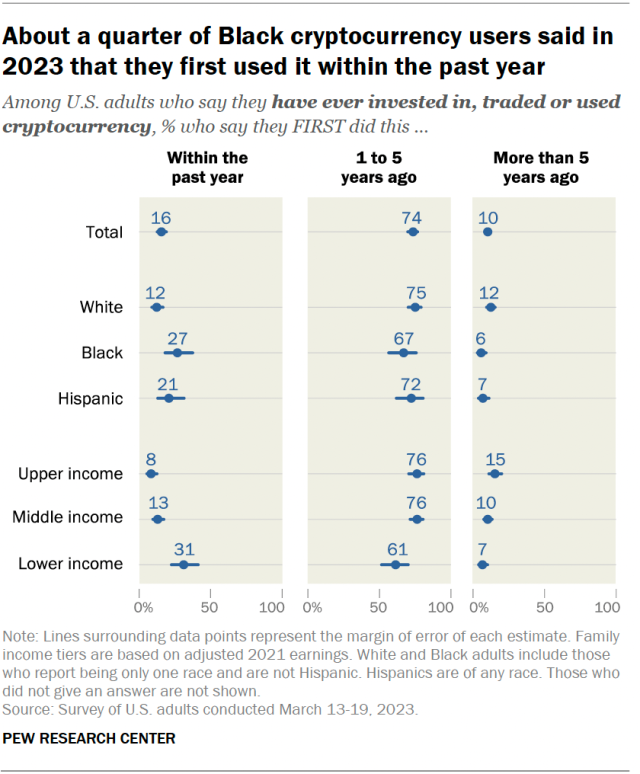The cryptocurrency landscape is grappling with significant issues, such as decreasing values, a rise in legal disputes, and ongoing regulatory discussions in Congress. A recent survey by Pew Research Center, conducted from February 7-11, reveals that skepticism about cryptocurrencies remains prevalent among Americans. Notably, the proportion of individuals who have engaged with cryptocurrencies has not seen any growth over the past three years.
The Pew Research Center undertook this examination to better grasp the American public’s perspectives and experiences concerning cryptocurrencies. This analysis is primarily drawn from a survey of 10,133 adults, conducted between February 7 and 11, 2024.
All survey participants were drawn from the Center’s American Trends Panel (ATP), which consists of individuals randomly selected from residential addresses nationwide. This methodology ensures a diverse representation of American adults. The survey was conducted either online or via telephone with live interviews, and its results have been adjusted to reflect the demographic makeup of the U.S. adult population across various criteria such as gender, race, ethnicity, political affiliation, education, and more. More details about ATP’s methodology are available here.
The 2024 survey incorporated responses from 651 Asian adults, predominantly English-speaking Asian Americans, indicating that this subgroup may not fully represent all Asian adults. Nonetheless, their insights are integrated into the overall analysis.
Below, you’ll find the questions raised and the responses, as well as the methodology applied in this study.
Approximately 63% of Americans express a lack of confidence in the reliability and safety of current cryptocurrency investment and trading methods. This includes 30% of adults who report being not at all confident, while around one-third indicate they are not very confident. Just 5% express strong to extreme confidence in cryptocurrencies, and 18% consider themselves somewhat confident.
These insights are consistent with findings released by the center in March 2023.
Concerns About Cryptocurrencies by Demographic Factors
Attitudes toward cryptocurrencies vary among different demographics. Adults aged 50 and above tend to exhibit greater skepticism compared to their younger counterparts, with 71% lacking confidence in cryptocurrency reliability, versus 55% of adults under 50.
Moreover, individuals who are well-informed about investing but have never invested in cryptocurrencies demonstrate even greater skepticism, with 82% reporting low confidence. In contrast, among cryptocurrency investors, only 39% share similar concerns, and 19% are very or extremely confident in their investments.
Demographics of Cryptocurrency Users
A total of 17% of U.S. adults report having engaged in cryptocurrency trading or usage, a statistic that has not changed since 2021.
By age and gender:

Demographically, men under 50 show a higher tendency to engage with cryptocurrencies compared to older men and women of all ages. For instance:
- 42% of men aged 18 to 29 report involvement with cryptocurrencies, whereas only 17% of women in the same age group do.
- 36% of men aged 30 to 49 have participated in cryptocurrency activities compared to 15% of women in that age range.
The use of cryptocurrencies varies across racial and ethnic groups as well:
- 28% of Asian adults have engaged with cryptocurrencies,
- 20% of Black and Hispanic adults report similar usage,
- 14% of White adults indicate having used cryptocurrencies, the lowest among these groups.
Income also plays a role in cryptocurrency engagement:
- 23% of individuals from high-income households have used cryptocurrencies,
- 18% from middle-income families,
- 14% from low-income households.
Political affiliation does not seem to significantly affect cryptocurrency usage. Approximately 20% of Republicans and Republican-leaning independents (18%) and Democrats and Democratic-leaning voters (17%) have engaged with cryptocurrencies.
Shifts in Cryptocurrency Ownership
While some individuals previously involved in cryptocurrencies have since divested their holdings, a growing number of Americans continue to evaluate the reliability and future of these digital assets.
A small fraction of Americans have dabbled in the world of cryptocurrencies, yet many of those who have ventured into this market continue to hold onto their digital assets.
Individuals who have engaged with cryptocurrencies in various ways include:

Currently, 61% of individuals report possessing cryptocurrencies, a decline from 69% in 2023. Conversely, 39% of respondents indicated they do not own any cryptocurrencies, a rise from 31% last year.
Looking at income levels:
Approximately 51% of adults in lower-income households who have interacted with cryptocurrencies state they no longer possess any, compared to 32% from middle-income households and 36% from higher-income households.
These figures have shown consistency with those from 2023, except for a notable increase among high-income users, rising from 21% to 36% who have exited the cryptocurrency market.
The Impact of Cryptocurrency Investments on Personal Finances

The financial fallout of investing in cryptocurrencies is a real issue for many. When participants were surveyed about their returns, 38% reported that their investments had not met expectations, while 37% found their investments to perform as they had anticipated. A slightly more positive outlook from 20% indicated that their investments exceeded expectations, and only 4% were uncertain about their performance.
In the previous year, a higher percentage (45%) expressed disappointment regarding their investment returns. Notably, as of 2023, many users feel these investments don’t significantly impact their personal finances.
In 2023, 60% of respondents stated their cryptocurrency investments had no positive or negative effect on their financial situation. Only 20% reported these investments contributed positively to their household finances at least to some extent, while 19% felt that it would bring about at least some negative consequences.
Individuals with a college degree (25%) or some college experience (20%) were more inclined to believe that cryptocurrency investments could negatively impact their finances compared to those with only a high school diploma (10%). There was considerable concern regarding this risk.
The Evolution of Cryptocurrency Usage in America

In 2023, we asked Americans about their initial experiences with cryptocurrencies. Findings indicate that a significant majority, approximately 74%, first engaged with cryptocurrencies between one and five years ago. A smaller segment reported entering the market recently—16% stated they began using cryptocurrency within the last year, while 10% indicated they had started more than five years prior.
By Race, Ethnicity, and Income Level
When examining the data by race and ethnicity, Black individuals demonstrated a higher likelihood of using cryptocurrency for the first time in the past year at 27%, compared to just 12% of white users. Additionally, 21% of Hispanic users reported similar experiences. However, the sample size for Asian American crypto users was not sufficient for separate analysis.
Furthermore, individuals from low-income households were notably more inclined to have entered the world of cryptocurrency within the past year, with around 30% of these users reporting their initial investment during this timeframe, in contrast to only about 10% from middle or high-income backgrounds.
Note: This article updates a previous report published on April 10, 2023, and includes a discussion of the questions posed, the responses received, and the methodology utilized in this study.


